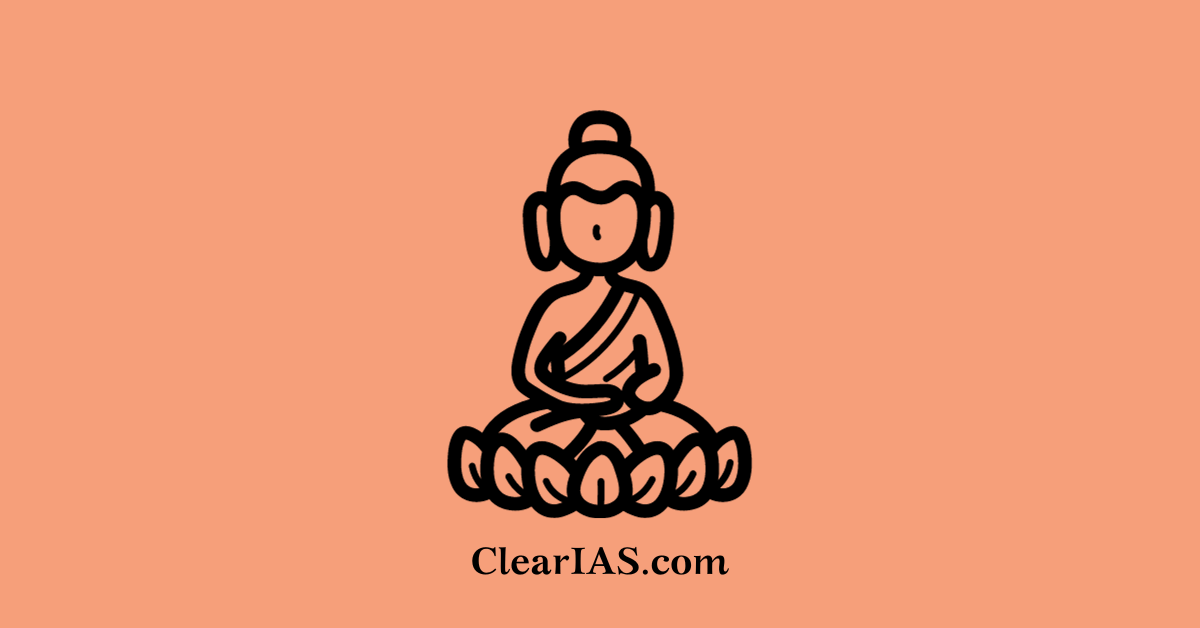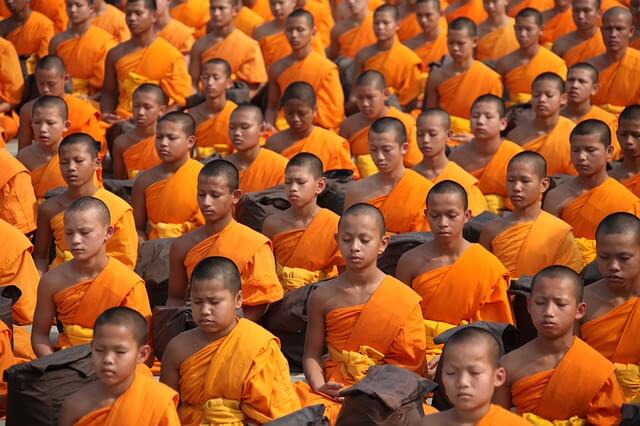 Following the death of the Gauthama Buddha, several assemblies were convened to settle doctrinal disputes and to recite Buddhist texts. These Assemblies were known as Buddhist Councils. This post will help readers to memorize the details of each Buddhist Council, much faster.
Following the death of the Gauthama Buddha, several assemblies were convened to settle doctrinal disputes and to recite Buddhist texts. These Assemblies were known as Buddhist Councils. This post will help readers to memorize the details of each Buddhist Council, much faster.
Buddhism

- Founded by Gautama Buddha (Sakyamuni) known originally as Siddhartha.
- Teachings of Buddha:
- Four Noble Truths (Arya satyas) – Dukkha, Samudaya, Niroda, and Magga.
- Eight-Fold Path (Ashtangika Marga) – Right view, Right resolve, Right speech, Right action, Right livelihood, Right effort, Right mindfulness and Right samadhi (“concentration”).
- Three Jewels (Triratnas) – the Buddha, the Dharma and the Sangha.
- Code of Conduct.
- Belief in Nirvana.
- Belief in Ahimsa.
- Buddhist Sangha: It consisted of monks and nuns, who acted as torchbearers of the dhamma. The worshippers were called upasakas.
Also read:
- Indian Philosophy: Orthodox and Heterodox Schools
- Ancient India: Hinduism, Buddhism and Jainism (NCERT)
Buddhist Councils

There were four Buddhist Councils. These Buddhist Councils are considered as the four milestones in the history of Buddhism. In order to address the issues during that period in Buddhism. They are as follows
First Buddhist Council
- Venue: In Sattaparnaguha Cave situated outside Rajgriha (the modern city of Rajgir).
- Year: 486 BC.
- King: Ajatasatru, son of King Bimbisara (Haryanka Dynasty).
- Presiding Priest: Venerable Maha Kasyapa with 500 monks.
- Took place 3 months after the Buddha’s Passing.
- The First Buddhist Council collected together and arranged the Buddhist Scriptures known as the Pali Tipitaka.
- Resulted in:
- Vinaya Pitaka which mainly contains the rules of the Buddhist order. This was recited by Upali.
- Suttapitaka was recited by Ananda. It contains the great collections of Buddha’s sermons on matters of doctrine and ethical beliefs.
Second Buddhist Council
- Venue: Vaishali.
- Year: 386 BC
- King: Kalasoka (Shisunaga Dynasty).
- Presiding Priest: Sabakami.
- Took place 100 years after the Buddha’s passing.
- In order to settle a serious dispute on Vinaya.
- The dispute arose over the ‘Ten Points.’
- This is a reference to claims of some monks breaking ten rules, some of which were considered major.
- The specific ten points were:
- Storing salt in a horn.
- Eating after midday.
- Eating once and then going again to a village for alms.
- Holding the Uposatha Ceremony with monks dwelling in the same locality.
- Carrying out official acts when the assembly was incomplete.
- Following a certain practice because it was done by one’s tutor or teacher.
- Eating sour milk after one had his midday meal.
- Consuming a strong drink before it had been fermented.
- Using a rug which was not the proper size.
- Using gold and silver.
- The key issue was the use of ‘gold and silver’, which is an Indic idiom that includes any kind of money.
Resulted in:
- The split of the Buddhist order into Sthaviravadinis(Theravada) and Mahasanghikas. The split was over small points of monastic discipline.
- The Second Buddhist Council made the unanimous decision not to relax any of the rules and censured the behaviour of the monks who were accused of violating the ten points.
Third Buddhist Council
- Venue: Pataliputra (today’s Patna).
- Year: 250 BC.
- King: Ashoka (Maurya Dynasty).
- Presiding priest: Mogaliputta Tissa (Upagupta).
- Its objective was to reconcile the different schools of Buddhism and to purify the Buddhist movement, particularly from opportunistic factions which had been attracted by the royal patronage.
- The responses to doctrinal questions and disputes formulated at the Third Council were recorded by Moggaliputta Tissa in the Kathavatthu, one of the books of the Abhidhamma Pitaka.
Resulted in:
- Made Sthaviravada School as an orthodox school – believed that the past, present, and future are all simultaneous. They may have contributed some formative influence to Mahayana.
- Codification of Abhidhamma Pitaka, dealing with Buddhist philosophy written in Pali.
Fourth Buddhist Council:
- Venue: Kundalavana, Kashmir.
- Year: 72 AD
- King: Kanishka (Kushan Dynasty), was a patron of Buddhism and was instrumental in spreading the religion in north-western borders of India.
- Presiding Priest: Vasumitra; deputed by Asvaghosha.
- The fourth Buddhist Council had to deal with a serious conflict between the Sarvasthivada teachers of Kashmir and Gandhara.
Resulted in:
- Sarvasthivada doctrines were organized into three large commentaries on the Pitakas.
- Final division of Buddhism into Mahayana & Hinayana sects.
Note:
The Theravada Buddhist council in 1871 and Theravada Buddhist council in 1954 are known as Fifth and Sixth Buddhist Councils respectively.
Article by: Jishnu J Raju






Really useful n detailed information….liked it …. 🙂
Vancancy here?
great job//thankuu
The almighty god helps them who help the common people.U’ve done the great job,god will help u surely.May god bless U👍👑
Great job guys………thanks a lot.
Great
But I am not able to find modern history notes
I want to know about the council organised by harshvardhan.
Done well God bless you
HEHHO
God bless you, clearIAS team. Thank you.
is it enough for buddhism part for upsc
First buddhist council ????